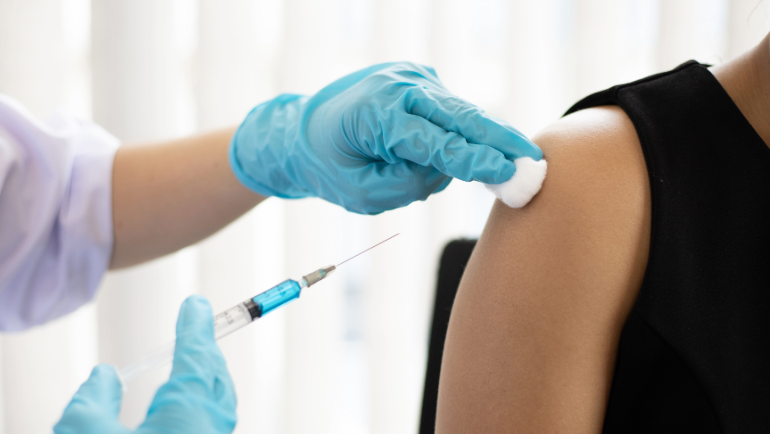
Low vaccination rates continue to create significant threats to public health for diseases such as whooping cough (pertussis), measles and COVID-19. Michigan's vaccination rates for recommended childhood immunizations have dropped to levels not seen in Michigan in more than a decade.
Ongoing efforts by experts at Wayne State University, in collaboration with local health departments and the Michigan Department of Health and Human Services, continue to promote vaccinations as important and safe public health measures. This includes addressing misinformation and misunderstanding about vaccinations.
“Whooping cough is a highly contagious respiratory disease currently circulating in Michigan,” said Paul Kilgore, M.D., M.P.H., co-director of the WSU Center for Emerging and Infectious Diseases and professor of Pharmacy Practice at Wayne State’s Eugene Applebaum College of Pharmacy and Health Sciences. “It can cause severe complications, especially in infants and older adults. Pertussis can lead to hospitalization and even death, particularly in young infants who have not yet completed their vaccination series. Parents should ensure their children receive the DTaP vaccine to protect them from this potentially life-threatening disease. Ensuring that all family members are up to date on their vaccinations can protect the youngest and most vulnerable members of families.”
Doctors and other health care providers typically give the DTaP vaccine — which protects against diphtheria, tetanus and pertussis — to children in five doses at 2, 4, 6 and between 15 to 18 months of age, with a final dose between the age of 4 and 6. Adolescents and adults should receive a booster dose of the vaccine to reduce the risk of transmitting the disease to vulnerable populations.
“The DTaP vaccine is very safe, and serious reactions are very rare,” said Teena Chopra, M.D., M.P.H., co-director of the CEID and professor of Internal Medicine and Infectious Diseases at Wayne State’s School of Medicine. “Immunity provided by the pertussis vaccine wanes over time, which is why booster doses are so important. Adolescents and adults, especially those who have close contact with infants, should receive a Tdap booster to reduce the risk of transmitting the disease to vulnerable populations.”
Older adults are also at increased risk for complications from pertussis due to weakened immune systems.
“Vaccination is the best way to prevent whooping cough in older adults,” said Marcus Zervos, M.D., co-director of the CEID, clinical professor of Internal Medicine at the School of Medicine and division head of Infectious Diseases at Henry Ford Health. “We encourage all adults aged 65 and older to talk to their health care provider about getting the Tdap vaccine.”
The Michigan Department of Health and Human Services has noted that measles, a serious childhood disease once largely eliminated in the United States through vaccination, is again circulating in Michigan. Measles is a highly contagious virus that can lead to severe complications, especially in children. Measles was at one point declared eliminated — defined as an absence of continuous disease transmission for more than 12 months — from the U.S. in 2000.
“We eliminated measles thanks to a highly effective vaccination program in the United States, as well as better measles control internationally,” Dr. Kilgore said. “However, measles risk is increasing globally, as well as in the U.S. and in Michigan. Ensure you are up to date with your measles vaccine.”
The Measles, Mumps and Rubella, or MMR, vaccination is a very safe and effective recommended vaccine to protect against these diseases. The U.S. Centers for Disease Control and Prevention recommends children should get two doses of MMR vaccine, starting with the first dose at 12 to 15 months of age, and the second dose at 4 through 6 years of age. Teens and adults should also be up to date on their MMR vaccination.
In addition, COVID-19 continues to circulate, with emergency room visits increasing 12% from late April to early June. The highly transmissible omicron subvariants have led to increases in COVID-19 cases and hospitalizations in Michigan and across the United States.
“COVID-19 vaccines remain a critical tool in preventing severe illness, hospitalization and death from the virus,” Dr. Zervos said. “We strongly encourage everyone who is eligible to stay up to date with their COVID-19 vaccinations, including booster doses when recommended. This is important for older adults, individuals with underlying health conditions and those who are immunocompromised. Staying current with COVID-19 vaccinations not only protects the individual, it also helps reduce the spread of the virus within communities.”
“Unfortunately, a great deal of misinformation, wild rumors and myths are circulating about vaccinations, creating confusion, mistrust and concern,” said Matt Seeger, Ph.D., co-director of the CEID and professor of Communication at Wayne State. “While we should ask questions and seek information about our health, it’s important to make sure we know the source of the information. Social media is more likely to include sensational information and rumors than established medical facts.”
Enhancing and empowering the health of the public and the communities WSU serves is at the heart of the university's Prosperity Agenda.
For more information about pertussis and vaccination recommendations, visit the Michigan Department of Health and Human Services website at https://www.michigan.gov/mdhhs/adult-child-serv/childrenfamilies/immunization or contact your health care provider.